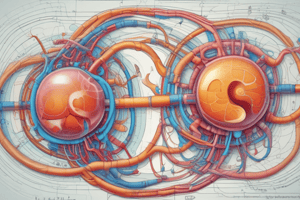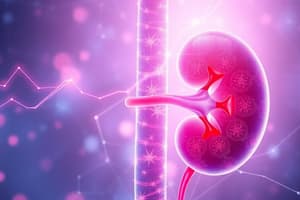Podcast
Questions and Answers
What is the primary function of metabolism in living organisms?
What is the primary function of metabolism in living organisms?
- to form and maintain tissue and govern energy storage and release (correct)
- to store and release oxygen
- to regulate body temperature
- to convert glucose into ATP
What is the primary use of potential energy in the nephron?
What is the primary use of potential energy in the nephron?
- blood pressure regulation
- epithelial transport (correct)
- waste removal
- glucose metabolism
Which organ consumes the second highest amount of oxygen per gram of tissue?
Which organ consumes the second highest amount of oxygen per gram of tissue?
- kidney (correct)
- liver
- lungs
- brain
Why does the kidney not require a lot of energy to reabsorb 99% of the glomerular filtrate?
Why does the kidney not require a lot of energy to reabsorb 99% of the glomerular filtrate?
What is required to form urine that differs in solute composition from that of the body fluids?
What is required to form urine that differs in solute composition from that of the body fluids?
What is the result of remixing urine with plasma?
What is the result of remixing urine with plasma?
What determines the minimum amount of energy required to form urine from plasma?
What determines the minimum amount of energy required to form urine from plasma?
What is the thermodynamic equivalent of forming a volume of urine with a solute composition equal to that of the body fluid from which it is formed?
What is the thermodynamic equivalent of forming a volume of urine with a solute composition equal to that of the body fluid from which it is formed?
What is the primary function of the kidney in terms of energy storage and release?
What is the primary function of the kidney in terms of energy storage and release?
What is the major determinant of the volume and composition of the urine?
What is the major determinant of the volume and composition of the urine?
What is the result of the kidney reabsorbing 99% of the glomerular filtrate?
What is the result of the kidney reabsorbing 99% of the glomerular filtrate?
What is the thermodynamic equivalent of partitioning a bucket into two compartments by the use of a divider?
What is the thermodynamic equivalent of partitioning a bucket into two compartments by the use of a divider?
What is the result of the kidney forming urine that differs in solute composition from that of the body fluids?
What is the result of the kidney forming urine that differs in solute composition from that of the body fluids?
What is the factor that determines the minimum amount of energy required to form urine from plasma?
What is the factor that determines the minimum amount of energy required to form urine from plasma?
What is the primary source of energy for the kidney?
What is the primary source of energy for the kidney?
What is the relationship between the energy required to form urine and the solute composition of the urine?
What is the relationship between the energy required to form urine and the solute composition of the urine?
Flashcards are hidden until you start studying
Study Notes
Metabolism and Kidney Function
- Metabolism refers to the entire set of interconnected chemical reactions within living organisms that form and maintain tissue and govern the storage and release of energy to sustain life.
Kidney Metabolism and Energy Requirements
- The kidney consumes the second highest amount of oxygen per gram of tissue (2.7 mmol/kg/min) after the heart (4.3 mmol/kg/min).
- Most of the potential energy provided by renal oxidative metabolism is committed to epithelial transport, which determines the volume and composition of the urine.
- The minimum net energy required for reabsorption does not depend on the amount of fluid that is reabsorbed.
- Energy is required to form a urine that differs in solute composition from that of the body fluids (i.e., plasma).
Thermodynamic Principles of Urine Formation
- Forming a volume of urine with a solute composition equal to that of the body fluid from which it is formed is thermodynamically equivalent to partitioning a bucket into two compartments, requiring no net energy.
- Energy is required to form urine from plasma and attain a state of reduced entropy, which is equal to the temperature multiplied by the decrease in mixing entropy associated with the differential solute composition of urine versus plasma.
Renal Solute Transport and Metabolism
- The sodium pump, Na+-K+-adenosine triphosphatase (ATPase), plays a crucial role in epithelial transport.
- Metabolic substrates fuel active transport along the nephron, with regional metabolic considerations.
- Renal blood flow, glomerular filtration rate (GFR), and tubuloglomerular feedback control fluid and electrolyte filtration and tissue oxygenation.
- The amount of oxygen consumed per sodium reabsorbed (Qo2/TNa) is a key indicator of kidney function.
- The metabolic efficiency of transport during normal perturbations and disease is an important aspect of kidney metabolism.
Metabolism and Kidney Function
- Metabolism refers to the entire set of interconnected chemical reactions within living organisms that form and maintain tissue and govern the storage and release of energy to sustain life.
Kidney Metabolism and Energy Requirements
- The kidney consumes the second highest amount of oxygen per gram of tissue (2.7 mmol/kg/min) after the heart (4.3 mmol/kg/min).
- Most of the potential energy provided by renal oxidative metabolism is committed to epithelial transport, which determines the volume and composition of the urine.
- The minimum net energy required for reabsorption does not depend on the amount of fluid that is reabsorbed.
- Energy is required to form a urine that differs in solute composition from that of the body fluids (i.e., plasma).
Thermodynamic Principles of Urine Formation
- Forming a volume of urine with a solute composition equal to that of the body fluid from which it is formed is thermodynamically equivalent to partitioning a bucket into two compartments, requiring no net energy.
- Energy is required to form urine from plasma and attain a state of reduced entropy, which is equal to the temperature multiplied by the decrease in mixing entropy associated with the differential solute composition of urine versus plasma.
Renal Solute Transport and Metabolism
- The sodium pump, Na+-K+-adenosine triphosphatase (ATPase), plays a crucial role in epithelial transport.
- Metabolic substrates fuel active transport along the nephron, with regional metabolic considerations.
- Renal blood flow, glomerular filtration rate (GFR), and tubuloglomerular feedback control fluid and electrolyte filtration and tissue oxygenation.
- The amount of oxygen consumed per sodium reabsorbed (Qo2/TNa) is a key indicator of kidney function.
- The metabolic efficiency of transport during normal perturbations and disease is an important aspect of kidney metabolism.
Studying That Suits You
Use AI to generate personalized quizzes and flashcards to suit your learning preferences.



